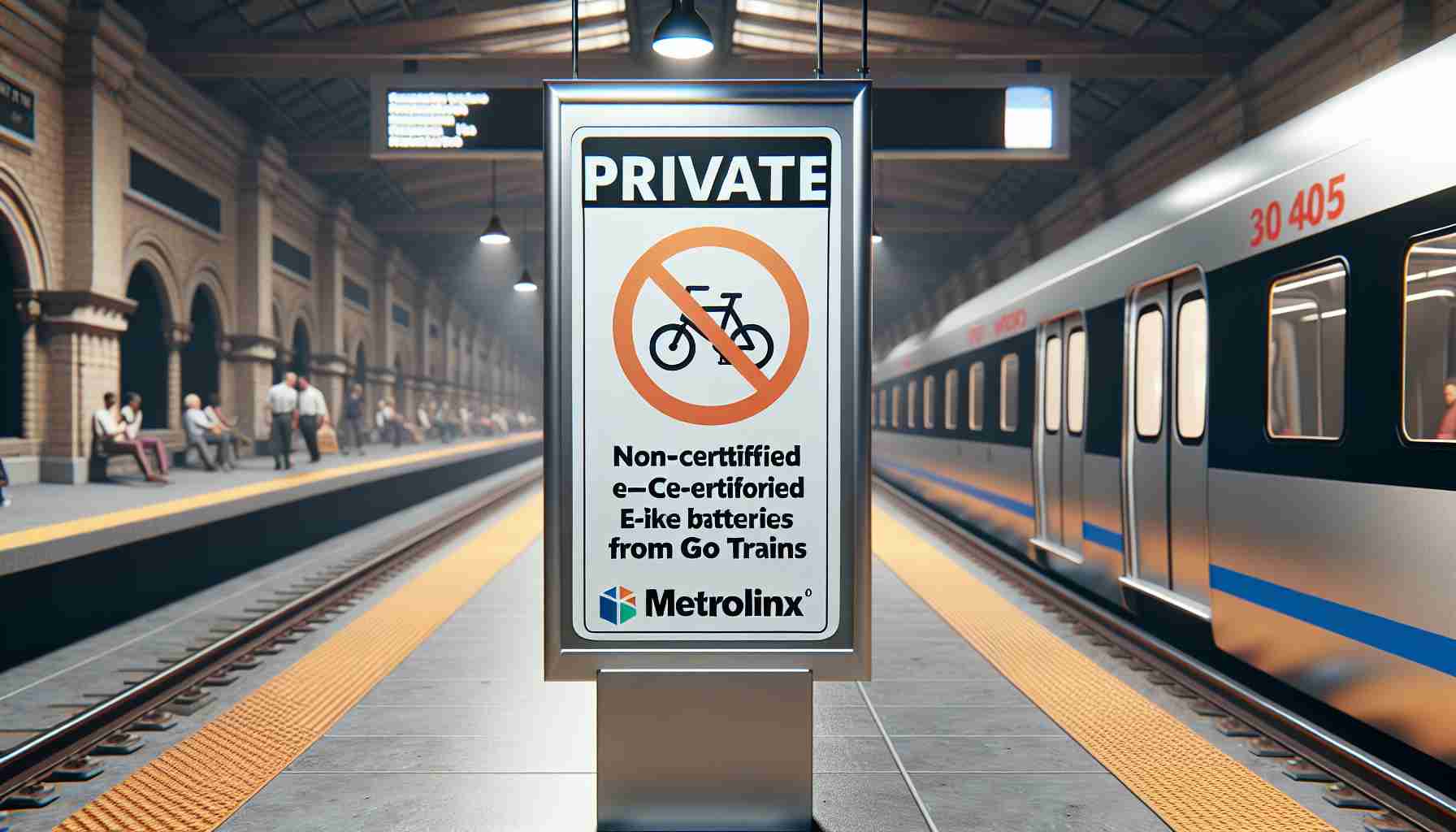Metrolinx, the regional transportation agency for Greater Toronto and Hamilton Area, is taking steps to improve passenger safety by banning non-certified e-bike batteries from all GO trains. This decision comes in response to the growing concern over battery fires in transit systems across the province.
As part of this move, Metrolinx has started conducting inspections of electric bicycles throughout their network to identify any uncertified batteries that could pose a fire hazard. Batteries that carry reputable certifications such as ‘UL’ or ‘CE’ will still be allowed on board, but problematic lithium-ion batteries and others without proper certifications will be prohibited.
While this ban is expected to impact only a small number of e-bike riders, its implementation is crucial to ensuring the safety of all passengers. Last year, Health Canada issued a warning about the potential dangers of lithium-ion batteries, especially in e-bikes. These batteries are larger and more powerful than those found in other products, making them more susceptible to thermal runaway, which can lead to explosions or fires.
According to experts in the industry, the problems associated with battery fires in e-bikes often stem from improper maintenance and the use of cheap, aftermarket batteries. Overcharging, using incorrect chargers, and substituting inferior batteries contribute to these safety issues.
Metrolinx’s decision to ban non-certified e-bike batteries aligns with their commitment to prioritize passenger safety. However, concerns have been raised about how riders will be informed about the new policy and whether fare inspectors have the necessary training to enforce it effectively. To address these concerns, proper communication channels need to be established, and riders should be educated about battery safety to prevent any inconvenience.
This battery certification process is part of a larger effort by Metrolinx to accommodate the increasing number of bike couriers using GO trains, particularly on the Kitchener line. Additional bike carriages have been added to trains on this route during the winter season, with plans to review and implement further solutions.
While the ban on non-certified e-bike batteries may disrupt some riders’ routines, it is a necessary step towards ensuring the safety and well-being of all passengers on GO trains. By proactively addressing battery safety concerns and providing storage options for bikes, Metrolinx aims to create a safer and more accessible transit system for everyone.
An FAQ section based on the main topics and information presented in the article:
Q: Why is Metrolinx banning non-certified e-bike batteries from GO trains?
A: Metrolinx is banning non-certified e-bike batteries from GO trains to improve passenger safety and address the growing concern over battery fires in transit systems.
Q: What type of batteries will still be allowed on board?
A: Batteries that carry reputable certifications such as ‘UL’ or ‘CE’ will still be allowed on board.
Q: What are the dangers associated with lithium-ion batteries in e-bikes?
A: Lithium-ion batteries in e-bikes are larger and more powerful than those found in other products, making them more susceptible to thermal runaway, which can lead to explosions or fires.
Q: Why do battery fires in e-bikes occur?
A: Battery fires in e-bikes often occur due to improper maintenance and the use of cheap, aftermarket batteries. Overcharging, using incorrect chargers, and substituting inferior batteries contribute to these safety issues.
Q: How will Metrolinx inform riders about the new policy and enforce it effectively?
A: Proper communication channels will be established to inform riders about the new policy. Fare inspectors are expected to receive necessary training to enforce the policy effectively.
Q: How is Metrolinx accommodating bike couriers using GO trains?
A: Metrolinx has added additional bike carriages to trains on the Kitchener line during the winter season. They are also reviewing and implementing further solutions to accommodate the increasing number of bike couriers.
Q: Why is the ban on non-certified e-bike batteries necessary?
A: The ban on non-certified e-bike batteries is necessary to ensure the safety and well-being of all passengers on GO trains. By proactively addressing battery safety concerns, Metrolinx aims to create a safer transit system.
Definitions for key terms or jargon used within the article:
1. Metrolinx: The regional transportation agency for Greater Toronto and Hamilton Area.
2. E-bike: Short for electric bicycle, which is a bicycle equipped with an electric motor to assist with propulsion.
3. Battery certification: The process of assessing and verifying that a battery system meets specific safety and performance standards set by reputable organizations.
4. Thermal runaway: A phenomenon where a battery’s internal temperature increases rapidly, leading to a release of energy, often resulting in explosions or fires.
5. Lithium-ion batteries: A type of rechargeable battery commonly used in e-bikes and many other electronic devices. They have a higher energy density but carry a higher risk of thermal runaway if not handled properly.
Suggested related links:
– Metrolinx official website
– Health Canada’s FAQ on e-bikes







